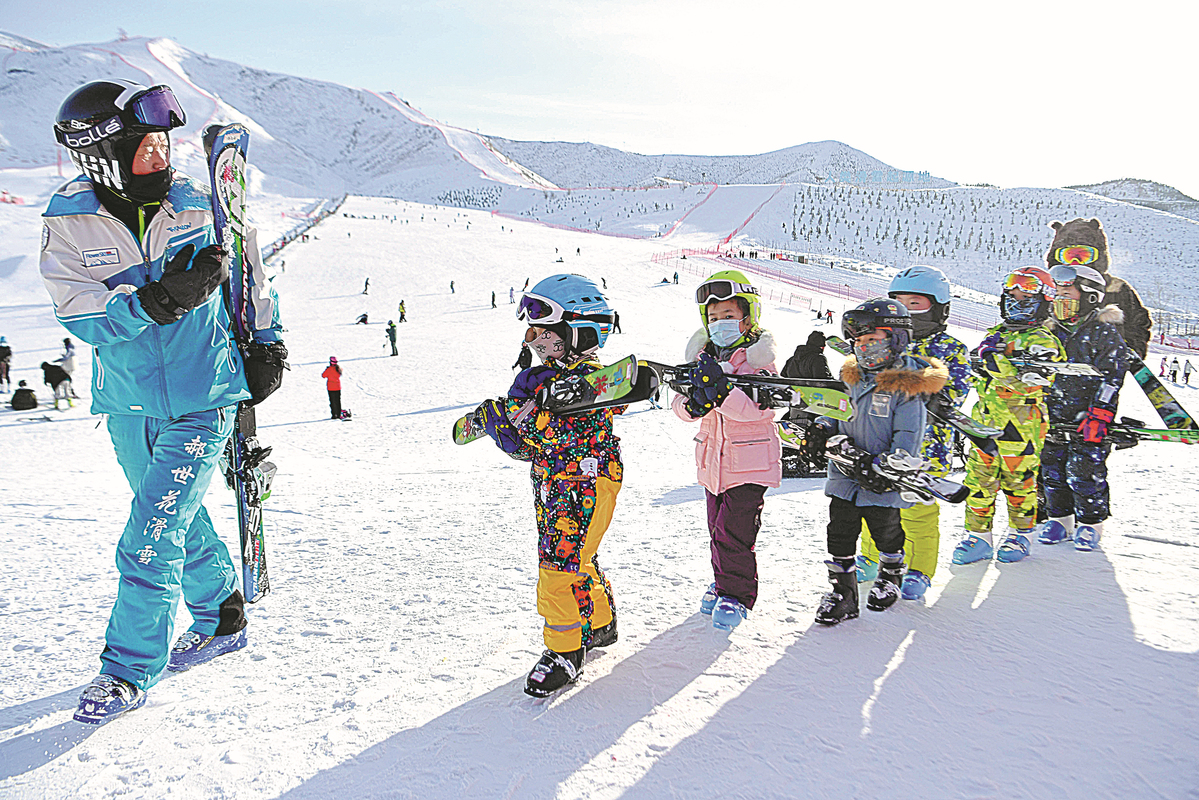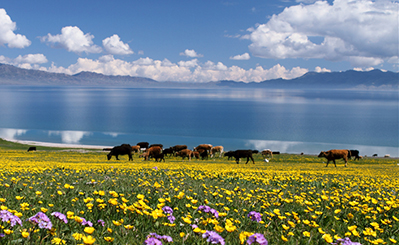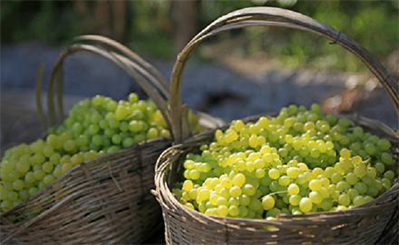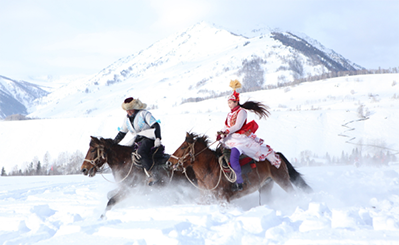Xinjiang emerges as winter sports hotspot amid Olympics

Children follow a coach to learn skiing at Jiangjunshan Ski Resort in Altay, Xinjiang Uygur autonomous region, on Feb 2. [Photo/Xinhua]
URUMQI-Boasting mountainous landscapes and long snowy seasons, the Xinjiang Uygur autonomous region in far west China has capitalized on Olympic fever to transform itself into a winter sports paradise.
Long history
Since a cave painting of people hunting on skis with poles was discovered, believed to be over 12,000 years old, Xinjiang's Altay city has been regarded by many as one of the birthplaces of skiing.
Local herders still preserve the traditional way of traveling with skis made of pinewood and horsehair.
Altay prefecture, which administers the city, is known for its long winter season that can last up to eight months a year. Today it is attracting skiers worldwide with its vast area of natural powder snow.
Wide participation
There is a growing presence of Xinjiang athletes in the Winter Olympics, from four at Pyeong-Chang 2018 to six at Beijing 2022, with Dinigeer Yilamujiang being one of them. The cross-country skier lit the cauldron together with Nordic Combined athlete Zhao Jiawen at the opening ceremony of the Beijing Winter Olympics.
The seeds of winter sports are being sowed among the next generation. Four years ago, Altay incorporated skiing into physical education courses for primary and secondary school students, the first city to do so in China. So far, skiing courses have covered around 50,000 local students.
The ice-snow fever has also extended to the southern parts of Xinjiang, where winter sports were once a luxury. In the Hotan prefecture on the edge of the Taklimakan Desert, locals can savor the joy of winter sports at the Oynak ski resort in Moyu county, which has launched a series of entertainment activities, including skiing, snowmobiling and camel riding.
"Ice and snow are rare in Hotan, and people's enthusiasm runs high," said the ski resort's manager Liu Dongsheng, who added that the resort had received over 100,000 tourists since its opening in 2016.
More venues
Public enthusiasm for ice-snow sports has gone hand-in-hand with the development of Xinjiang's winter sports facilities over the years.
With China's successful bid to host the Winter Olympics and the fulfillment of its pledge to engage 300 million people in winter sports, Xinjiang has made full use of its ice-snow resources. Winter sports venues have mushroomed in the region, said Li Jianhong, head of the regional winter sports association.
By the end of last year, Xinjiang had 188 venues for ice-snow sports activities, including 60 amusement parks, said data from Xinjiang's sports bureau.
Winter tourism
Xinjiang has been promoting winter tourism to turn itself into a winter sports hub. The region received over 3.6 million tourists during the seven-day Spring Festival holiday from Jan. 31 to Feb. 6, reaping about 2.6 billion yuan ($400 million) of tourism revenue.
"Our ski resort now receives around 2,000 visitors every weekday. On Saturday or Sunday, the number will rise to 4,000. A growing number of tourists outside Xinjiang flocked here to savor the joy of winter sports," said Xue Wenjun, deputy general manager of the Silk Road Resort in Urumqi, capital of Xinjiang.
"Xinjiang is making efforts to build a world-class ice-snow industry. We hope tourists can soak in multiple ice-snow tourism products and more local farmers and herdsmen can fatten their wallets," said Hou Hanmin, deputy director of the regional culture and tourism department.
Business boom
The great market potential of the ice-snow industry has also created a new business boom.
Decked out in a stylish ski suit and goggles, Zhang Bo leisurely roamed around at a ski resort in Urumqi. "I used to purchase ski suits of foreign brands. This time around, I opted for a Xinjiang brand. It's just trendy and cool," he said.
Zhang's snowsuit was made by Yaju Bedding& Clothing in Habahe county. The company launched five new production lines last year, bringing its annual production capacity to 300,000 ski suits, its chairwoman Li Yumei said.
Espying the massive potential of the ice-snow economy, Li decided to manufacture ski suits with camel hair. "Camel hair and snow are both unique local resources. Combining them will make our products more competitive," she added.
Several other winter sports equipment made by Xinjiang enterprises, such as passenger ropeway and magic carpets, have piled into various scenic spots and ski resorts nationwide.
Xinhua
 Attractions
Attractions Dining
Dining Culture
Culture